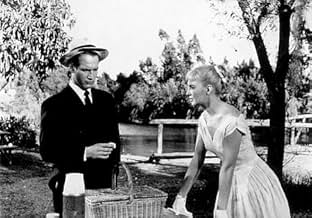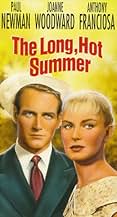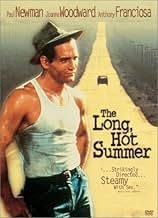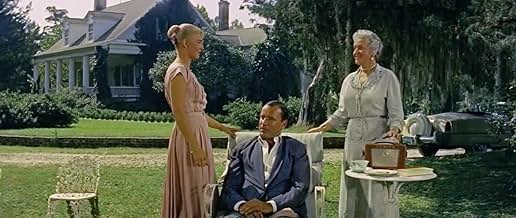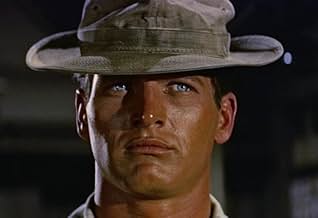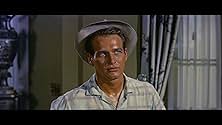आरोपी खलिहान बर्नर और ठग बेन क्विक एक छोटे से मिसिसिपी शहर में आता है और जल्दी से अपने सबसे अमीर परिवार के साथ खुद को जोड़ता है।आरोपी खलिहान बर्नर और ठग बेन क्विक एक छोटे से मिसिसिपी शहर में आता है और जल्दी से अपने सबसे अमीर परिवार के साथ खुद को जोड़ता है।आरोपी खलिहान बर्नर और ठग बेन क्विक एक छोटे से मिसिसिपी शहर में आता है और जल्दी से अपने सबसे अमीर परिवार के साथ खुद को जोड़ता है।
- निर्देशक
- लेखक
- स्टार
- पुरस्कार
- 2 जीत और कुल 4 नामांकन
- Lucius
- (as William Walker)
- Ambulance Driver
- (बिना क्रेडिट के)
- Man at Auction
- (बिना क्रेडिट के)
- Man at Auction
- (बिना क्रेडिट के)
- Man at Auction
- (बिना क्रेडिट के)
- Linus Olds
- (बिना क्रेडिट के)
- Woman at Auction
- (बिना क्रेडिट के)
फ़ीचर्ड समीक्षाएं
Nevertheless I loved this movie and the stellar cast that included Lee Remick as Joanne's sister in law, Tony Franciosa as her disturbed brother, Orson Welles as their dominant bullying father, Angela Lansbury as Welles' girlfriend and Richard Anderson as Joanne's boy friend. Beautifully shot and superbly directed by Martin Ritt, the movies just sparkles thanks to these actors.
Although the plot is definitely familiar territory, and the script errs fairly strongly on the affected style customary to the post-Actors Studio era, the story resonates truthfully and remains engaging throughout, while the alluring undercurrent of barely-bridled sexuality keeps the proceedings energetic and urgent. Ritt's direction is taut but unfussy, allowing the inherent claustrophobia and tension of the film's small-town setting to speak for itself, and the sumptuous Technicolor cinematography is so crisp you can practically smell the marsh and sweat from the Mississippi bayou (and I'm not even just talking about Orson Welles). Although the climax feels like a somewhat forced attempt to escalate the stakes simmering throughout, with an overly hasty resolution to boot, the buildup is calm and confident enough to make the viewing experience worth its while without having to fight to engage its audience.
Naturally, like the majority of its contemporaries, the story ultimately exists as a vehicle to foreground the performances of the cast, who are what ultimately make the film worthwhile. Paul Newman, cementing his iconic identity as the shrewd, laconic, effortlessly cool drifter, crackles with charisma as accused arsonist Ben Quick, magnetic throughout even before his surprisingly racy shirtless scene. Joanne Woodward gives arguably the film's strongest performance as the controversially unmarried Clara Varner, practically vibrating in place from a lifetime of feeling discounted and under-appreciated. Rather than playing up her predicament, however, Woodward embodies Clara with a steely confidence, which is altogether more effective and appealing. In contrast, Orson Welles delivers the film's most legendarily outlandish performance as the resident belligerent patriarch. Notoriously mocking the Actors' Studio by mumbling almost incomprehensibly through his cartoonish southern drawl, the vociferous Welles is skilled enough to steal scenes in his sleep (which he may well have been during certain scenes), outrageously fun when hamming it up, with occasional pockets of surprising solemnity and depth, as if coming up for air from his customary grunting and snorting. Anthony Franciosa is also a sturdy presence, even if he does occasionally overindulge in Method hand-wringing and hysteria, while a cameo from the delightful Angela Lansbury as Welles' cheerily aggressive suitor adds a dash of comedic perfection.
While it may fall short of the acerbic intensity of similar fare such as Cat on a Hot Tin Roof, The Long, Hot Summer still serves a healthy slice of all the smouldering, robustly acted 1950s melodrama you could ask for. If only for the incandescent interplay between Newman and Woodward, with the added pleasure of cartoon-character Welles, the film is easily worth sinking into, on a dozy, hot summer evening or otherwise.
-7/10
Based on some William Faulkner short stories, The Long Hot Summer commences when Joanne Woodward and Lee Remick, daughter and daughter-in-law of local patriarch Orson Welles give drifter Paul Newman a lift into town. Woodward's a repressed school teacher and Welles despairs of her finding a suitable match.
Because he started dirt poor and worked his way up to the top, Welles takes a liking to Newman and pushes, a little too hard for Newman and Woodward to team up. That's not sitting real well with Anthony Franciosa who is Welles's son and sees Newman displacing him in the family pecking order.
In fact my favorite in the film is Franciosa, he usually is in any film he's in. When he's on the screen, you don't pay attention to anyone else, not even Orson Welles.
Welles borrows a bit from Tennessee Williams's Big Daddy Pollitt from the Paul Newman film the year before, Cat On a Hot Tin Roof. His Will Varner though is a bit softer around the edges, also lends itself more easily to caricature. I think the creators of The Dukes of Hazzard used Welles in The Long Hot Summer as their model for Boss Hogg.
In fact it's interesting to see the contrast in The Long Hot Summer and Cat On a Hot Tin Roof. It's obvious to me that William Faulkner liked the people of Mississippi a whole lot more than the southerners that are in Tennessee Williams's work.
Almost fifty years later, The Long Hot Summer is still enjoyable viewing and still may be the best of Paul and Joanne's joint ventures.
The Long, Hot Summer changes most of what happens in The Hamlet, but it still ends up feeling very Faulknerian (if a little Hollywoodized, especially around the ending). The Hamlet contains a cast of several dozen townfolk and the Snopes family, a Northern family of carpetbaggers who have their eyes set on the hamlet of Frenchman's Bend. The main character in the novel is Flem Snopes. His name is changed in the film to Ben Quick, who was himself one of the original townspeople in the novel (in fact, the Quick family, although they never play a major role in any novel or even short story, pops up constantly in Faulkner's mythology). Quick is played impeccably by Paul Newman. If Flem Snopes had remained as he was written by Faulkner, Paul Newman would have been way too handsome to play him. Instead, the screenwriters,Irving Ravetch and Harriet Frank Jr., have made him more likable without losing his complexities. They do it by making Ben Quick the little boy who runs away from his barn burning father ( from the short story, one of Faulkner's most anthologized, Barn Burning). That little boy disappears without a trace in Faulkner's writings. Flem Snopes, a teenager during Barn Burning, stays by his father's side afterwards.
Will Varner remains fairly intact in the film, the most enterprising of any person in the community. He may actually have a more complex character in the film than in the novel. The literary character is more or less an opponent who is forced to deal with Flem Snopes and his family. Here, Will Varner meets a man who reminds him too much of himself in Ben Quick. The filmic Varner has a rather selfish desire to have grandchildren before he dies, and he tries desperately to get his two children to reproduce for him. In the novel, Will Varner has 16 children. With Orson Welles, we should expect nothing more than the best, and we get another one of his masterful performances here. Will Varner is a lot like Hank Quinlan from Touch of Evil (which was released the same year), and the complexities that Welles communicates here are equal to his Charles Foster Kane or Harry Lime.
All the other characters are basically completely changed from the novel. Eula Varner is still a sexpot, but she is no longer Will Varner's youngest daughter, but his dauther-in-law (Flem Snopes originally married her). I don't remember Jody Varner too much from the novel, but I'm pretty sure the insecurities he feels towards Ben Quick were created by the screenwriters (Will Varner never got chummy with Flem Snopes in the novel, so there would be less of a reason for the hatred of Jody). I believe Clara Varner either didn't exist in the novel, or she was much less important. She certainly wasn't the school teacher, since he fell in love with Eula Varner at 13 and ultimately had to resign because of his lust, and then one of the Snopeses taught, I think I.O.
The part of this film that really gives it power is the amazing dialogue. I'm pretty sure that no direct dialogue, or at least very little, was taken from the novel. It was all created by Irving Ravetch and Harriet Frank Jr. It is absolutely poetic. I don't think that there is much dialogue in the novel. Faulkner rather likes to tell his stories silent for the most part. Also, if you are a Faulkner fan, or a fan of this novel in particular, keep your eyes open for echoes of other novels or of things that have dropped out here. There is the sewing machine salesman crack when Ben Quick is approaching Varner's mansion (a joke about the salesman Ratliffe, who provides a majority of The Hamlet's point of view), the hint at Absalom, Absalom! (when one of Varner's horses foals near the end), and the hint at A Light in August (the fire in the distance, the townspeople moving towards it). All in all, The Long, Hot Summer is a masterpiece. It is a beautiful, passionate, and intelligent film, and the best literary adaptation of which I am aware, or maybe only second to The Unbearable Lightness of Being.
"The Long, Hot Summer" (1958) is based on five short stories and a novel by one of the America's greatest novelists and storytellers, the expert of Southern life, William Faulkner, and the film is a steamy, moving, often funny (perhaps, unintentionally) tale of lust, greed, jealousy, and larger than life personalities and their clashes. I guess I need to read more Faulkner's stories because I was surprised to see the film that is based on the works of the writer known for his heavy use of such sophisticated literary techniques as symbolism, allegory, and especially stream of consciousness, the film which linear narrative is easy to follow from the third person point-of-view.
Besides Paul Newman who was as talented as he was hot, his off- screen wife-to-be Joanna Woodward shines as Clara Varner, Will's intelligent, thinking daughter, the teacher in a local school whom her father wants to see married (and not just wants but takes certain steps that Clara does not like and feels offended by). The film was the first of many Newman's and Woodward's collaboration and it is not easy to recall the greater chemistry between two leads. Orson Welles dominates the screen in his every scene as expected. 21-years-old Lee Remick (Eula, Varner's daughter-in-law, sexy and innocent woman-child), Anthony Franciosa (Jody, Varner's overlooked and jealous son), and Angela Lansbury (Minnie, the woman who has her own plans about future that include a widower Varner in them) all add to the sizzling fun that "The Long Hot Summer" is.
क्या आपको पता है
- ट्रिवियाDirector Martin Ritt was forever known after this movie as the man who tamed Orson Welles. During filming, Ritt drove Welles to a local swamp, kicked him out of the car and forced him to find his own way back.
- गूफ़When Varner sees Jody digging in the yard looking for so called treasures, Jody hands him a silver dollar and Will says it was minted in 1910. No silver dollars were minted between 1904 and 1921. The coin Ben showed him while at gunpoint was likely a $5 gold piece but Will is holding what looks like a silver dollar.
- भाव
Clara: Mr. Quick, I am a human being. Do you know what that means? It means I set a price on myself: a high, high price. You may be surprised to know it, but I've got quite a lot to give. I've got things I've been saving up my whole life. Things like love and understanding and-and jokes and good times and good cooking. I'm prepared to be the Queen of Sheba for some lucky man, or at the very least the best wife that any man could hope for. Now, that's my human history and it's not going to be bought and sold and it's certainly not gonna be given away to any passin' stranger.
- कनेक्शनEdited into The Greatest Showman (2017)
टॉप पसंद
विवरण
- रिलीज़ की तारीख़
- कंट्री ऑफ़ ओरिजिन
- भाषा
- इस रूप में भी जाना जाता है
- The Long Hot Summer
- फ़िल्माने की जगहें
- Clinton, लुइसियाना, संयुक्त राज्य अमेरिका(town: Frenchman's Bend)
- उत्पादन कंपनी
- IMDbPro पर और कंपनी क्रेडिट देखें
बॉक्स ऑफ़िस
- बजट
- $15,00,000(अनुमानित)
- चलने की अवधि
- 1 घं 55 मि(115 min)
- रंग
- पक्ष अनुपात
- 2.35 : 1


